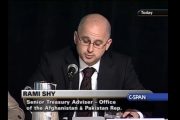
As information continues to come to light, things are getting darker and darker for Democrats. Amid a storm of reports about Clinon/Russian collusion stemming from the UraniumOne deal, former FBI Director Comey’s protection of Hillary during the “investigation” into her illegal use of a private e-mail server, and new congressional probes into both of those scandals, it has now become apparent that the Clinton campaign and the Democratic National Committee (DNC) broke campaign finance laws by hiding the fact that they funded the fake “dossier” that alleged President Trump’s connections to and control by Russia.
Reports began to surface Tuesday that funds to pay for the creation of the discredited “dossier” came from both the Clinton campaign and the DNC. That in and of itself — aside from the fact that the document is rife with salacious lies — would be a perfectly legitimate political activity; campaigns and parties often finance “opposition research.” Where Clinton and company crossed the line was in failing (read: refusing) to disclose the funding in keeping with campaign finance laws.
When the so-called dossier (so-called because the document is clearly a fraudulent attempt to defame Trump by trotting out — as fact — a pack of lies that stretch the imagination to the breaking point) was reported in January, it was celebrated by many (but not all) in the liberal mainstream media as a “smoking gun” proving that Hillary Clinton was correct when she called Trump “Putin’s puppet.” It also found support from Trump’s enemies in the intelligence community.
The fact that Trump’s enemies in the media and intelligence community bought into the story of the dossier without verifying it’s outrageous claims says much more about them than it says about Trump. This is especially true since Fusion GPS (the company paid by the Clinton campaign and DNC to build a dossier on Trump proving his connections to and control by Russia) appears to have pilfered the most titillating parts of the narrative from a false narrative created as an Internet prank.
And while the Clinton campaign and DNC seem to have been able to dodge embarrassment for helping spread the dossier around, they may find it a great deal more difficult to avoid serious consequences for hiding the fact that they paid Fusion GPS to create the document.
Campaigns and parties are required by law to show an accounting of what monies come in (and from whom) and what monies go out (and to whom and for what). In keeping with their values of dishonesty and underhanded dealing, Clinton and the DNC described the payments as “legal services” in an apparent attempt at plausible deniability to any connection to the creation of the dossier.
As Daily Mail reported Wednesday, Marc Elias, a Clinton campaign lawyer, “brokered a deal between the Clinton camp, the Democratic National Committee and opposition research firm Fusion GPS to dig up dirt on the president while he was running for office.” He then spent the next year lying and denying his involvement. His involvement and his patent dishonesty are both so undeniable that even some liberal establishment media were compelled to out him, with two reporters from the New York Times taking to Twitter to do so.
Tweeting on Tuesday night, Times reporter Maggie Haberman said, “Folks involved in funding this lied about it, and with sanctimony, for a year.” Kenneth Vogel was less subtle, tweeting, “When I tried to report this story, Clinton campaign lawyer @marceelias pushed back vigorously, saying ‘You (or your sources) are wrong.’”
To add to the list of liberal media who appear to be turning on Clinton, it was the Washington Post that tied Elias and his law firm, Perkins Coie, to the deal to finance the dossier. And the Seattle Times reported Tuesday that the “Clinton campaign and the Democratic National Committee (DNC) helped fund research that resulted in a now-famous dossier containing allegations about Donald Trump’s connections to Russia and possible coordination between his campaign and the Kremlin.” The report names Marc Elias — whose law firm is located in Seattle — as the middle man who brokered the deal.
Perhaps the liberal media sharks smell blood.
If so, they are not alone. The nonprofit Campaign Legal Center filed a complaint with the Federal Election Commission (FEC) on Wednesday, claiming that the Clinton campaign and the DNC violated federal law when they “undermined the vital public information role of campaign disclosures” by “filing misleading reports.” Adav Noti, who filed the complaint, is both a senior director of trial litigation and strategy at Campaign Legal Center and a former FEC official. He wrote in his complaint, “Voters need campaign disclosure laws to be enforced so they can hold candidates accountable for how they raise and spend money. The FEC must investigate this apparent violation and take appropriate action.”
Brendan Fischer, director of federal and FEC reform at Campaign Legal Center, said, “Questions about who paid for this dossier are the subject of intense public interest, and this is precisely the information that FEC reports are supposed to provide.” He added, “Payments by a campaign or party committee to an opposition research firm are legal, as long as those payments are accurately disclosed. But describing payments for opposition research as ‘legal services’ is entirely misleading and subverts the reporting requirements.”
So with scandal after scandal coming to light, two new congressional probes, the beginnings of scrutiny from once-friendly media, and now an FEC complaint, it seems that Clinton may have a hard road ahead.
The next few weeks and months will show whether Clinton’s Teflon holds up. If not, she may have some serious consequences to face. Truth can be brutal, especially for those who aren’t used to having to face it.
Photo: Clipart.com




